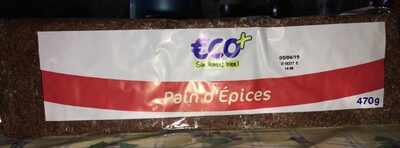
Barcode: 3450970070911
Pain d’épices
DOUBTFUL
📝 Reason: The product contains ingredients with doubtful Halal status due to unspecified sources (E450). According to Islamic dietary laws, any ingredient of doubtful origin must be avoided. The presence of such ingredients renders the entire product doubtful for consumption by Muslims seeking Halal compliance.
📄 Certificates: None
Ingredients:
Details
Exploring the Halal Status of Pain d’épices
Pain d’épices, a traditional spiced bread, often captivates the taste buds with its rich flavors. However, for many Muslims, there’s more to consider than just taste—there’s the important question of whether it’s Halal. This inquiry leads us to delve into the ingredients and their origins, which can oftentimes blur the lines of Halal compliance.
What Makes Pain d’épices Doubtful?
The Halal status of Pain d’épices is marked as doubtful due to the presence of certain ingredients, particularly E450, which has unspecified sources that could potentially be of animal origin. According to Islamic dietary laws, any ingredient of doubtful origin must be avoided. Thus, this uncertainty makes Pain d’épices a questionable choice for Muslims who strictly adhere to Halal diets.
Ingredient Breakdown
Let’s explore the individual components of Pain d’épices and their respective Halal statuses:
- E200 (Sorbic Acid): A common preservative used in various food products, E200 is generally considered Halal. This ingredient helps in preventing mold and bacteria growth, thus prolonging shelf life. [Source: Halal Watch World]
- E450 (Diphosphates): This is where things get complicated. E450 is mainly used as a leavening agent, but its source isn’t specified, raising concerns regarding its Halal suitability. Since its origin could potentially be animal-based, Muslims seeking Halal compliance should be wary of consuming products containing E450. [Source: Halal Watch World]
- E500 (Sodium Carbonates): Another leavening agent, E500 is considered Halal as it is primarily derived from sodium carbonate, which is plant-based and safe for consumption. [Source: Halal Watch World]
- Rye Flour: This is a plant-based ingredient used in Pain d’épices and is generally regarded as Halal. It lacks any animal derivative, making it suitable for a Halal diet. [Source: Islamic Dictionary]
- Rapeseed Oil: Also Halal, rapeseed oil is a plant-based product used for its cooking properties. It doesn’t contain any harmful additives and is typically safe for Muslim consumers. [Source: Islamic Dictionary]
- Spices: The blend of spices adds the essential flavor to Pain d’épices and, being plant-derived, they are generally deemed Halal. They must, however, be sourced from reputable suppliers to ensure no cross-contamination occurs.
- Malted Wheat Flour: Like the others, this flour is plant-based and considered Halal, contributing to the bread’s distinct texture and flavor. [Source: Islamic Dictionary]
Conclusion
While Pain d’épices possesses numerous ingredients that are generally recognized as Halal, the presence of E450 casts a shadow over its overall compliance with Islamic dietary laws. For practicing Muslims, the product’s doubtful status due to this ingredient means it may be best to consult with halal certification authorities or avoid this product altogether. Always remember that when in doubt, it’s a good practice to opt for products that carry a clear Halal certification to ensure peace of mind and adherence to dietary laws.
